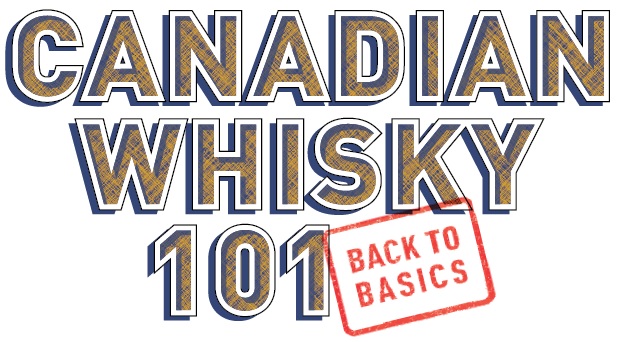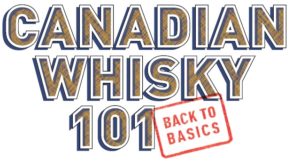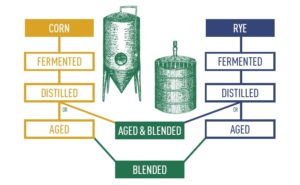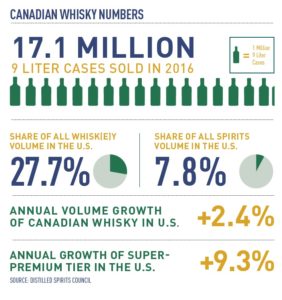
By Jeff Cioletti
 Time to set the record straight about Canadian whisky (Canadians, like the Scottish, leave out the ‘e’), one of the most misunderstood categories in all of spirits. And calling it a “category” doesn’t do it justice, as, stylistically, whisky made in Canada can be a lot of things and is not easily pigeonholed. Fortunately, people are starting to get a bit better acquainted with Canada’s finest, as the market on the southern side of the border is starting to experience a surge. This is an important time to consider
Time to set the record straight about Canadian whisky (Canadians, like the Scottish, leave out the ‘e’), one of the most misunderstood categories in all of spirits. And calling it a “category” doesn’t do it justice, as, stylistically, whisky made in Canada can be a lot of things and is not easily pigeonholed. Fortunately, people are starting to get a bit better acquainted with Canada’s finest, as the market on the southern side of the border is starting to experience a surge. This is an important time to consider
Canadian whisky options.
Because the category as a whole is already well established, recent innovations in the direction of rye-focused bottlings, flavor infusions and ultra-premium offerings should merit the attention of a solid audience.
Where Is It Made?
The initial distillate destined for Canadian whisky need not be distilled in Canada. In fact, U.S. laws encourage the inclusion of American spirit in the mix. For a product to be called “Canadian Whisky,” it must be aged for at least three years in barrels within Canadian borders.
What Is It Made From?
 Unlike the producers of many other types of whisk(e)y, such as American rye or bourbon, Canadian distillers are not constrained by mash bill mandates. Where bourbon must be at least 51 percent corn and American rye at least 51 percent rye, there’s no similar stipulation for Canadian whisky. Rye often has been among the grains used in the spirit, but it’s often played a supporting role. As consumption of rye whiskey has exploded in recent years, a number of Canadian distillers have been making more rye-forward whiskies.
Unlike the producers of many other types of whisk(e)y, such as American rye or bourbon, Canadian distillers are not constrained by mash bill mandates. Where bourbon must be at least 51 percent corn and American rye at least 51 percent rye, there’s no similar stipulation for Canadian whisky. Rye often has been among the grains used in the spirit, but it’s often played a supporting role. As consumption of rye whiskey has exploded in recent years, a number of Canadian distillers have been making more rye-forward whiskies.
Did You Know?
There’s a common myth that U.S. Prohibition helped put Canadian whisky on the map, but the opposite is actually true. The Canadian market suffered greatly from its America’s abstinence, as its southern neighbor had been the largest market for the product when it was legal. And that business vanished virtually overnight. Bootlegging certainly was happening, but the illicit business was minuscule
compared with the legitimate trade that had suddenly disappeared.
How Is It Made?
Another key distinction is the manner in which the grains are distilled. In most other whisk(e)y producing countries, when the spirit’s mash bill includes multiple grain types, they’re blended at the grain level. In Canadian whisky, each grain is fermented and distilled separately and then blended. This is why in Canada the Master Blender is considered a higher title than Master Distiller.
So, for instance, a Canadian distiller would make a whisky that’s 100 percent rye, one that’s all corn, another that’s all wheat and one more that’s all barley. Those spirits are then blended, usually after a period of maturation, sometimes before (Canadian Club is a notable exception that’s blended pre-maturation). The rye has much more influence on the overall flavor profile when blended at the spirit level.
How Is It Aged?
 Some mature in new oak. Others age in previously used barrels, including those that once contained Bourbon, other whiskies, Sherry or Port are also used. It all depends on the desired flavor profile.
Some mature in new oak. Others age in previously used barrels, including those that once contained Bourbon, other whiskies, Sherry or Port are also used. It all depends on the desired flavor profile.
Uniquely Canadian
Maple as a flavor is naturally associated with Canada, and it happens to work quite well with whiskey. Some are finished in toasted maple-wood barrels; these benefit from the fact that maple has very little tannic acid, reducing harshness. Others are blended with a dash of pure maple syrup, for a more over flavor.
What Does It Taste Like?
Time to put the notion of Canadian whisky as “brown vodka” in the past.
- If the product uses a lot of virgin oak casks, it, like bourbon, will pull more of the flavor characteristics from the wood: vanilla, caramel, toffee, etc.
- If there’s significant rye content, expect a lot of spicy, peppery, clove-like notes. Drinkers also will detect a certain fruitiness and grapefruit-esque bitterness in many types of Canadian whisky.
- One of the biggest myths is that Canadian whisky is not very flavor forward. While some of the entry-level whiskies are on the smoother side, many are downright robust.
Fun Facts
More than two-thirds of Canadian whisky is exported to the U.S.
- Some trace Candian whisky’s popularity here back to Prohibition, but it was actually began during the Civil War, when many distilleries in the South shut down.
- Until 2010, Canadian was the best-selling brown spirit in America; it is now second to bourbon.
- It is a misconception that Canadians add neutral spirits to their whiskies. WRONG. While this occasionally happens in America, it’s not part of the Canadian process.
Trends in Canadian Whisky
- Beyond maple, apple, vanilla, peach and cinnamon are finding their way into Canadian whisky
- Topping the Canadian whisky off with bourbon or Sherry (perfectly legal)
- Distinctive barrel finishes; some distillers mature in new oak, others in previously used barrels, including those that have contained bourbon, other whiskey, Port or Sherry.
Canadian Cocktails
- Whisky Sour: Many bartenders have favored Canadian whisky as the go-to base for the Whisky sour.
- The Toronto: Combines whisky with Fernet Branca, demerera syrup and bitters. A recipe appeared in the 1948 book “The Fine Art of Mixing Drinks,” by David Embury.
- Highball: The spirit also makes a frequent appearance in the classic whisky highball, which marries the spirit with tonic, club soda, seltzer or ginger ale.
- The Canadian: A classic cocktail that combines whisky with orange Curaçao,
simple syrup and Angostura bitters, served in an Old Fashioned Glass with an orange zest garnish. The drink appeared in the 1934 book, “Cocktail Bill Boothby’s World Drinks and How to Mix Them.” - Hot Toddies: Canadians are no strangers to bitter cold snaps in winter, so it’s no surprise that their local whiskies make ideal bases in hot toddies. A common recipe includes an ounce and a half of Canadian whisky, an equal volume of boiling water, a teaspoon of sugar and cloves.
Selling Points
- Consumer interest in world whiskies beyond Scotch, bourbon and Japanese is surging and Canada is one of the countries leading in this space.
- Consumers have been falling in love with American rye whiskey—it’s been growing well into the double digits— which has helped open the door for Canadian whisky, especially the ones with more rye forward flavor profiles.
- There’s something for every level of whisk(e)y appreciator, from the dabbler to the connoisseur. Many of the big-volume brands are very approachable and highly mixable, while the super-premium tier offers world-class whiskies for the discerning sipper.
- Today’s consumers crave “authenticity”in products they purchase; Canadian whiskies are synonymous with that concept, with their storied history, hand-crafted heritage and folksy legends.
Interested in learning more? The definitive resource of the spirit is Davin deKergommeaux’s “Canadian Whisky: The Portable Expert.”
View, download and share the pdf of this story here.



